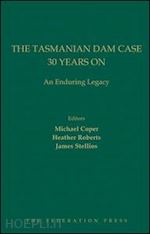
Questo prodotto usufruisce delle SPEDIZIONI GRATIS
selezionando l'opzione Corriere Veloce in fase di ordine.
Pagabile anche con Carta della cultura giovani e del merito, 18App Bonus Cultura e Carta del Docente
In one of the great contests between State and federal power, the Tasmanian Dam Case pitted the immovable object of Tasmania’s commitment to a massive hydro-electric project against the irresistible force of the Commonwealth’s determination to protect the environment.
Who would prevail? Was it more important to create jobs and provide cheap power, or to preserve the natural beauty of the Tasmanian wilderness? On whom did the Australian Constitution confer the power to decide this question?
By the narrowest of majorities, the High Court decided in 1983 that the Commonwealth had the final say, and upheld legislation that prohibited the construction of a dam on the Gordon River below the Franklin.
Because of the passions aroused by the case, the Court took the unprecedented step of issuing a statement explaining that its job was not to decide whether the proposed dam was a good idea or not, but to determine whether this was a matter of State or federal power. Yet this issue was just as hotly contested. Could any subject be brought within federal power merely by the presence of an international treaty on that subject? Would affirming this proposition destroy the intended balance between State and federal power? Would denying the proposition disable Australia from full participation in international affairs?
Three decades after the High Court’s decision, these and other questions of law and policy remain of vital importance. This book brings together a fascinating collection of commentaries on the impact of the decision, and how the hopes and fears following the decision have played out.
This stimulating and timely book contains reflections from then Commonwealth Attorney-General Gareth Evans, then High Court Justice Sir Anthony Mason and leading Indigenous lawyer Professor Mick Dodson. The book also examines some novel questions, such as whether the outcome of the case was inevitable, how similar issues have played out in Canada, and whether better conservation outcomes are more likely to come from the Commonwealth or the States. These and other chapters offer fresh perspectives on one of the most important cases in High Court history.
CONTENTS
Preface and Acknowledgments
About the Contributors
Table of Cases
Table of Statutes
1. Introduction
Michael Coper, Heather Roberts and James Stellios
2. The Background Politics of the Tasmanian Dam Case
The Hon Gareth Evans AC QC
3. Prelude to the Tasmanian Dam Case – Constitutional Crises, Reserve Powers and the Exercise of Soft Power
Anne Twomey
4. The Tasmanian Dam Case
The Hon Sir Anthony Mason AC KBE GBM
5. Precarious Federalism: The Tasmanian Dam Case, the Corporations Power and the ‘Inevitable’ Drive Towards Centralism
Alison Hammond
6. The Tasmanian Dam Case – An International Lawyer’s Perspective
Bill Campbell QC
7. The Tasmanian Dam Case and Australia the Good International Citizen
Donald R Rothwell
8. Treaty Implementation in Canada – A Comparative Perspective on the Tasmanian Dam Case
Rosalind Dixon, Nesha Balasubramanian and Melissa Vogt
9. Human Rights and the Tasmanian Dam Case
George Williams
10. Indigenous People as Linked to Place, the Race Power in the Tasmanian Dam Case
Mick Dodson and Siobhan McDonnell
Tasmanian Dam Case and the ‘Green Commonwealth’ Hypothesis
Andrew Macintosh
Index
Michael Coper is Professor of Law at the ANU College of Law, having been Dean of the College from 1998 to 2012. A graduate of the University of Sydney in Arts and Law in 1970, Michael was one of the seven founding fathers of the UNSW Law School in 1971 and taught there until he moved to Canberra in 1988 to take up his appointment as a Member of the Inter-State Commission. After a brief period in legal practice in the early 1990s, he was appointed as Professor of Constitutional Law at the ANU in 1995, following the retirement of the esteemed Professor Leslie Zines. Michael’s books include Freedom of Interstate Trade Under the Australian Constitution (1983), Encounters with the Australian Constitution (1987), and, as co-editor, The Oxford Companion to the High Court of Australia (2001). He has appeared as counsel in the High Court in a number of cases, including the landmark Cole v Whitfield (1988), and is both a Fellow of the Australian Academy of Law and a member of the American Law Institute.
Dr Heather Roberts is an interdisciplinary researcher, exploring the intersections of constitutional law, judicial biography, feminism and legal history. Her particular interests are in the history and biography of Australian courts, and the role of court ceremony in telling those stories. Heather has published book chapters, articles in leading journals and has spoken widely at Australian and international conferences on these topics. She is Senior Lecturer at the Australian National University College of Law, having previously practiced as a solicitor at a national corporate law firm.
Dr James Stellios holds the position of Associate Professor at the Australian National University College of Law. He has written extensively on constitutional law. He is the author of The Federal Judicature: Chapter III of the Constitution (2010) and the co-author of The Constitution of the Commonwealth of Australia – History, Principle and Interpretation (2015) and Hanks Australian Constitutional Law: Materials and Commentary (2013). He is also a barrister at the NSW Bar.











Il sito utilizza cookie ed altri strumenti di tracciamento che raccolgono informazioni dal dispositivo dell’utente. Oltre ai cookie tecnici ed analitici aggregati, strettamente necessari per il funzionamento di questo sito web, previo consenso dell’utente possono essere installati cookie di profilazione e marketing e cookie dei social media. Cliccando su “Accetto tutti i cookie” saranno attivate tutte le categorie di cookie. Per accettare solo deterninate categorie di cookie, cliccare invece su “Impostazioni cookie”. Chiudendo il banner o continuando a navigare saranno installati solo cookie tecnici. Per maggiori dettagli, consultare la Cookie Policy.